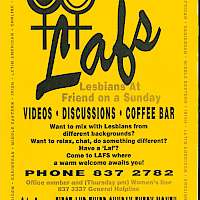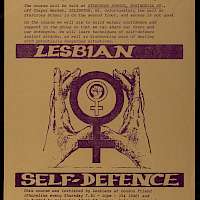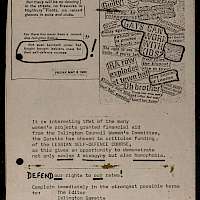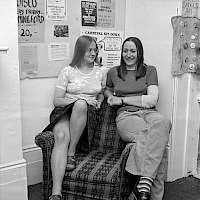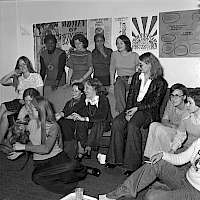Lesbians at London Friend
By Elizabeth Beacon and Claudia Merlo
London Friend aimed to serve the needs of LGBTQ+ people of all genders since it began in 1972, but it struggled to attract women as both volunteers and service users in the 1970s. 88% of calls to the helpline were made by men during the late 1970s, while in the early 1980s women made up 12% of the London Friend membership. 1
In 1977 the General Secretary of London Friend, Roland Jeffery, spoke to the Islington Gazette to promote their new women’s group. While other services at London Friend were already available to women, it seems that this was the first group specifically for women in London Friend. Although not many women used London Friend, Jeffery pointed out to the Gazette that one third of their volunteers were women. 2
In the meanwhile, women and lesbians were starting the services they needed themselves, which sometimes meant moving away from mixed organisations like London Friend. In the mid-1970s women involved in London Friend and other mixed LGBTQ+ organisations like London Gay Switchboard, split off to form Lesbian Line, a separate women-only helpline. 3
Despite these early efforts, significant change didn’t happen before 1983, when a new group, Lesbians at London Friend, began. The group dedicated Thursdays to women-only activities, from counselling to social groups, which was a step forward. As new women’s groups and initiatives were created in the 1980s the gender balance at London Friend slowly improved.
1983 saw the emergence of the Lesbian Self Defence Group at London Friend. This was a 12-week course, run by Lesbians at London Friend. The year before, London Friend’s experience of running a mixed Gay Self-Defence Group had led them to realise that women and men had different needs and thus needed different training, which led to the formation of a lesbian-specific group. 4
The Lesbian Self Defence Group attracted controversy from both inside and outside Friend. The Islington Gazette criticised the group having had its equipment bought by the Council’s Women’s Committee, arguing this made Islington the most extreme left wing council in London: ‘not even Lambeth under Ted Knight bought lesbians mats for their self-defence courses.’ 5 Even within Friend, Bernard Greaves, a member of the National Friend Management Committee, reported that some people in London Friend had expressed ‘considerable anxiety’ about the self defence group being a ‘doctrinaire extreme left-wing council [Islington Borough Council] subsidising the training of politically motivated separatist and militant lesbians in the use of violence’. Greaves, however found the lesbian self-defence group ‘‘perfectly well integrated with the men and not militant either in their demands nor in their manner,’ 6 and in London Friend’s 1983 annual report, the group was described as being successful.
Through the 1980s, the number of groups for women at London Friend increased, as did the overall representation of women within the organisation. In 1988, two new groups for women were introduced: Changes, a group for women coming to terms with their sexuality, and Lesbians at Friend on Sundays (LAFS). LAFS met twice a month, and meetings were casual and relaxed - with many meetings ending in the pub. After this, in October 1989, Onyx (a group for lesbians of colour) was established, although it left London Friend after a year for the Camden Women’s Centre. London Friend later commissioned a Race Equality Report which was completed in 1993 and helped them think through the reasons for Onyx’s departure. 7
London Friend’s cumulative efforts to recruit more women as counsellors, volunteers, and service users were eventually successful. In 1990 there were now six men and six women sitting on London Friend’s management committee; by 1995 there was a majority of women on the committee and by 1996 an equal number of male and female counsellors. 8 These achievements reflect the hard work done over time to increase the representation of women in London Friend.
In 2022, alongside groups that are open to everyone, two groups at London Friend are specifically designed for women. The Changes coming-out support group still runs twice a month, as does the LBT women’s crafternoon group, which aims at providing a sober space for LBT women to socialise.
Footnotes
- London Friend Annual Report (1983), London School of Economics, HCA/Friend/1/1
- ‘It’s A Friend of Women Too’, Islington Gazette, 30 September 1977, Bishopsgate Institute, Lesbian and Gay Newspaper Archive
- London Friend Annual Report (1983)
- ‘Better Defence’, Capital Gay, 10 September 1982, Bishopsgate Institute
- ‘Gazette Attacks Lesbians’ leaflet, London School of Economics, HCA/Friend/Additional/3/32
- Report on Visits to London Friend for the National Management Committee,16 October 1983, London School of Economics,HCA/Friend/Additional/1/6
- London Friend Annual Report (1988-89), Bishopsgate Institute; Race Equality Report, Race Equality at London Friend, Savi Hensman, December 1993, London School of Economics, HCA/Friend/Additional/3/32
- London Friend Newsletter, 31 January 1990, Islington Local History Centre; Marian Larragy, ‘The Presence Of Women At London Friend Increased SignificantlyIn The Period 1984 To 1995 And That Change Was Closely Related To Feminism’, thesis, unpublished, Birkbeck.
Gallery
Bibliography
‘Better Defence’, Capital Gay, 10 September 1982, Bishopsgate Institute
‘It’s A Friend of Women Too’, Islington Gazette, 30 September 1977, Bishopsgate Institute, Lesbian and Gay Newspaper Archive
‘Gazette Attacks Lesbians’ leaflet, London School of Economics, HCA/Friend/Additional/3/32
London Friend Annual Report (1983), London School of Economics, HCA/Friend/1/1
London Friend Annual Report (1988-89), Bishopsgate Institute
London Friend Newsletter, 31 January 1990, Islington Local History Centre, Box 1 (Uncatalogued)
Race Equality Report, Race Equality at London Friend, Savi Hensman, December 1993, London School of Economics, HCA/Friend/Additional/3/32
Report on Visits to London Friend for the National Management Committee,16 October 1983, London School of Economics, HCA/Friend/Additional/1/6
Marian Larragy, ‘The Presence Of Women At London Friend Increased Significantly In The Period 1984 To 1995 And That Change Was Closely Related To Feminism’, thesis, unpublished, Birkbeck.
